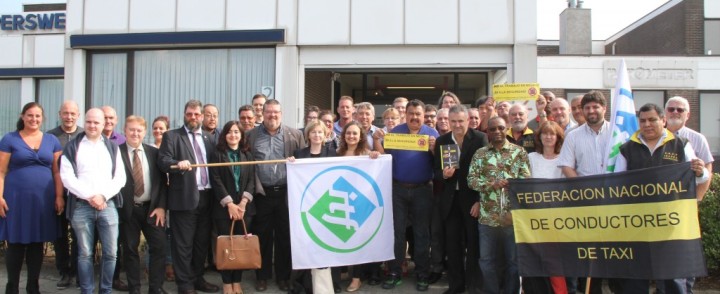ITF-Transport unions seek common Uber-approach
Nearly 40 trade unionists from 19 countries representing almost every continent presented their country’s Uber-experiences and explored a common approach as International Transport Worker’s Federation (ITF). The IRU (presenting its UpTop activities) and a member from the European Parliament joined the meeting.
On September 20 and 21 ITF held its Second Uber Strategy Meeting, this time in Antwerp. Host Frank Moreels, president of BTB Belgium and vice-chair of ITF’s road transport section, opened the meeting by saying that “Uber and other app-based models promote themselves to passengers as innovative, but are based on deregulation, destabilisation, disrespect for workers, ignoring legislation, not paying taxes or contributing to social security.”
“Uber acts like a ‘hidden’ employer”, he added. “Communicating with clients and workers by mail, by text. Uber drivers are hired and fired by e-mail, contracts are signed electronically.” But at the same time Moreels didn’t spare the taxi trade: “Traditional taxi operators need to up their own game in terms of respecting their drivers and innovating to meet passengers’ expectations, if they are to meet the challenges of the Uber business model.”
The meeting, hosted jointly by ITF Belgian affiliates BTB and ACV Transcom, examined how Uber Technologies and other taxi/courier app firms like Lyft and Gett are increasing their market share in many countries. The companies promote themselves purely as electronic marketplaces that connect customers and drivers using mobile apps, often illegally, in conflict with existing taxi service regulations.
Each union representative presented an update of Uber’s and union-activities in their respective countries. An inspiring mix. Some unions seemed to be at the beginning of the ‘Uber-road’, others had experienced Uber and similar apps for longer. Participants shared their experiences of wins against Uber in cities like Austin, Texas (USA); Brussels, Buenos Aires and Copenhagen. Although they differed on the most efficient way to fight the apps, they all agreed that Uber could influence politicians to find other ways to re-enter cities it had been banned in.
Every union had initially started its campaign with demonstrations using taxis blocking the roads in order to make the public aware of the dangers of Uber and the unfair competition to the taxi trade. Most found these actions quickly backfired and lost them the goodwill of the public, stuck in long traffic jams. Most unions also found that these demos were hijacked by their opponent, drawing attention to the ‘unreliable cabbies.’
Unions have since built national coalitions with other partners in the transport sector, started lobbying politicians and used the courts to sue Uber & Co together with groups of drivers. Both sides can influence politicians, despite the fact that the ‘app-people’ have much deeper pockets to finance armies of lobbyists.
Danish union 3F followed a very different approach. They created Poul Uberman, when they found it was difficult to explain to the Danish public what could possibly be wrong with a tech-savvy company which supplies them with friendly drivers, cheap and quick rides and perhaps even with a bottle of water….
“No, Uber, it’s not just an app” is the slogan on the website www.uberman.dk and the YouTube-commercials. Why? “Uber is damaging Danish welfare”, claims 3F.
For instance, the site features a video in which fictitious Uber user Poul Uberman – a Danish comedian – visits his elderly mother in a residential home, enthusiastic about how he came by Uber, taking advantage of its cheap prices whilst moaning about the poor conditions in his mother’s home. “You see, it’s not a Danish company. They’re in a tax haven. The drivers put the money straight in their pockets, so it’s half price!” explains Uberman enthusiastically. The video also gives some insight into Uber’s business and tax practices: unregulated vehicles, drivers without proper security checks, tax-evasion.
Since May, when the series of videos started, Uberman has become a cult figure, generating a lot of discussion on social media. “Poul Uberman is someone who thinks it’s very smart to save lots of money by using Uber, but he doesn’t understand why there’s not enough money for his mother to eat decent food or take a bath every day,” Jan Villadsen, chairperson for 3F transport, told Danish TV2. “Just because you have a smart concept, a smart name and a smart app, it doesn’t mean that you are smart, good and fair to everybody in Danish society,” Villadsen said.
Meanwhile, Bhairavi Desai from the New York Taxi Workers’ Alliance commented that it was vital to win the trust of TNC and taxi workers alike to develop union campaigns. “Unions need to share global strategies based on universal principles to protect workers against the predatory ‘Ubernomics’ business model, which is destroying full time work and replacing it with ‘sub-minimum poverty gigs’.
But with autonomous vehicles looming at the horizon, the transport workers union are certainly in a pickle: what will remain of their member base. Who will be left working in the taxi industry? Or driving a bus? What will happen with these jobs?
Concluding the meeting, ITF road transport section vice-chair Frank Moreels said: “Unions are certainly not against computer technology in the taxi sector. What we are against is these companies undermining public safety and the jobs of real, regulated taxi drivers by bypassing regulations and refusing liability in the case of accidents. That is why unions across the globe have come together and agreed some common steps to take.”
Around 700 unions, representing more than 4.5 million transport workers from 150 countries, are members of the International Transport Workers’ Federation. Every part of the world is represented by the ITF and taxi drivers throughout the world have a say in the ITF. Uber is present in more than 205 cities in 45 countries across six continents. (Wim Faber)
- Nearly 40 trade unionists from 19 countries presented their country’s Uber-experiences and explored a common approach as International Transport Worker’s Federation (ITF).



